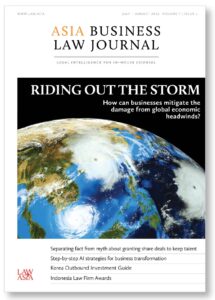A guide to surviving and thriving
Weakening economic activity around the globe has sent shivers through Asia over soaring prices and a supply chain crisis that could easily spiral nations into recession. The US economy has shrunk for the second quarter in a row this year, while Europe has seen the highest inflation level since the euro was introduced. The world’s second-ebiggest economy, China, has slowed as a zero-covid policy begins to hurt and its property market is in freefall.
Many parts of the world are yet to fully recover from the health crisis and Asia will undoubtedly feel the knock-on effects. In July, the Asian Development Bank revised its growth forecast for developing Asian economies from 5.2% to 4.6% for 2022, citing a substantial slowdown in global growth that could adversely affect exports, manufacturing activity and employment prospects, and cause turbulence in financial markets.

Asia Business Law Journal
Although making a business recession-proof is impossible, legal advisers can help build resilience. Our Cover story delves into many scenarios of how companies can deal with supply chain disruptions and mitigate the inflationary spiral.
Some have been able to replicate and disperse operations across countries, using new technologies like digitalisation and teleworking systems to co-ordinate and manage production from a distance. Others have re-shored or on-shored supply chains back to their home countries.
“Digital technologies can reinvent the way a company does business, to be more productive, agile and responsive in order to deliver higher value to customers at lower costs,” says Subir Bikas Mitra, legal adviser to India’s state-owned natural gas exploration and production group, GAIL, and president of the Federation of Indian Corporate Counsel. “Few areas of a business can benefit from digitalisation more than the supply chain. The potential value locked up in slow and inefficient processes, compounded across many trading partners, is huge.”
During this challenging time, many startups struggling to scale up operations are finding themselves in a battle to attract and keep talent within a tight budget. This makes a benefit plan that grants shares to the employees at a predefined or discounted price, called the employee stock ownership plan (ESOP), a feasible and popular alternative.
However, our article titled ESOP fables reveals that such a plan is not always optimal for retaining employees or attracting new talent. In some cases, companies are reported to oblige employees to participate in the stock ownership plans, while on the other hand, employee retention ironically becomes problematic after the company manages to sell its shares to the public.
Our Intelligence report, AI step-through, lays out strategies for legal professionals to navigate their businesses and overcome barriers to adopting artificial intelligence (AI). Many companies are heavily investing in AI, and more and more AI products and technologies are being launched by companies that are not traditional software companies, signalling a transition where AI could be a critical way to disrupt their markets and gain market share.
Lawyers need to keep abreast of new and fast-evolving technologies, and the integration of AI in a company’s products also entails new business strategies and monetisation models, which lawyers need to understand and help shape.
In this issue, we are also excited to bring you the second edition of our annual Korea Outbound Investment Guide. This is a collaborative supplement in association with the Korea In-house Counsel Association, which has insights from expert lawyers in some of the most exciting economies around the Asia-Pacific and Africa including India, Indonesia, Mozambique and the Philippines. The guide provides practical advice to South Korean in-house counsel and senior management on managing their investments overseas.
This issue also packs in the Indonesia Law Firm Awards 2022, recognising an elite mix of traditional independent law firms and international players in the country’s vigorous legal market. We have identified four law firms proven to be the best of the best, and among them Hadiputranto Hadinoto & Partners has risen to the top as Law Firm of the Year.
Finally, be sure not to miss our annual Philippines A-List, which showcases the top 100 lawyers in the country relied on by businesses at home and abroad, as well as by international law firms.
Best wishes
Putro Harnowo
Senior Associate Editor,
Asia Business Law Journal


























